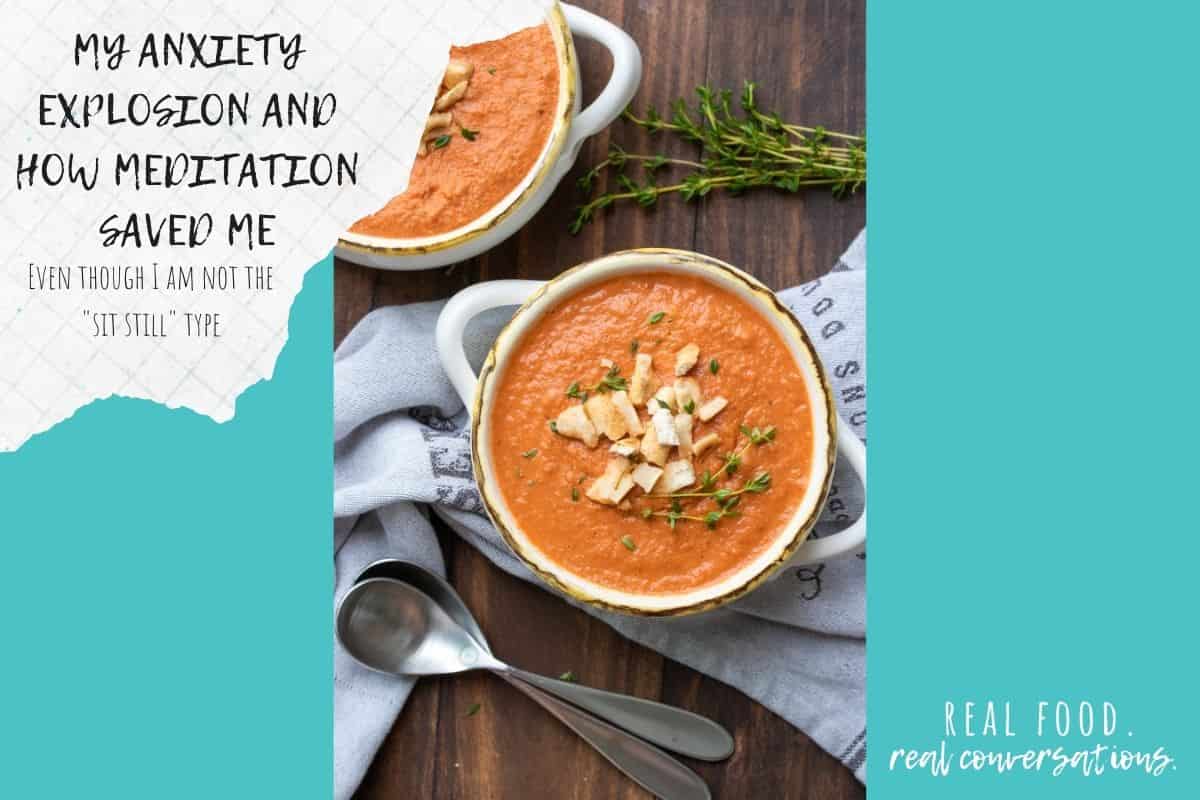I didn't want to believe anxiety and meditation had a close relationship. Sitting still was not my thing, but desperation changes you.

I used to laugh when people told me I should try meditating. It seemed like such a hippy thing to do, definitely not for someone that thrived on cardio and boot camps and was always on the move.
Podcast: Play in new window | Download | Embed Subscribe now! Apple Podcasts | iHeartRadio | TuneIn | Deezer | RSS | More
But as I piled on all the things in life, and kept turning to more hard core movement to "help" the building anxiety, I started to realize that I needed something different.
Are Meditation and Anxiety Related?
Meditation is essentially a practice of mindfulness, practicing being in the moment instead of thinking of all the things that can or may happen.
One characteristic of anxiety is focusing on things that may or can happen instead of focusing on the here and now.
So being able to practice letting go of all the "what if's" can greatly help your anxiety. Essentially, mediation is one great practice you can do to help reduce anxiety.
When you are able to focus on what is happening in the current moment, your brain isn't worried about the future. Which helps calm your thoughts and any impending anxiety.
Types of Mediation
Meditation is a practice where you focus your mind for a period of time. This can be done in many different ways. Here are a few I have tried and liked.
Mindfulness meditation is one of the most common forms and one of the easiest to start with. It's when you sit quietly and pay attention to your thoughts.
You don't judge them or start to think about them, you simple let them pass by while you focus on feelings and sensations in your body.
Transcendental meditation is also pretty popular. This is when you repeat a mantra, or series of words, over and over. This can help with ultimate inner relaxation and to get your mindset in the right place.
Guided meditation is the type that you find in many of the apps or online support sites. A teacher will guide you through the practice, which makes it a great place to start for beginners.
Movement meditation is essentially what you think of as yoga. But it can be other things like simple taking a walk in nature. Your mind is focused on the movement and letting it guide you.
How do you meditate properly?
There is no rule as to what is the right way to meditate. You need to find what works for you, but keeping the focus on the here and now and not allowing your mind to actively be involved in thoughts that pass through.
Mediation can even be as simple as starting with brushing your teeth while focusing on brushing your teeth. Starting with small steps to get your mind used to focusing on one thing will help.
Mediation for beginners
When I started, I thought it was bogus. I never thought I could do it. But I followed a great piece of advice, which is start small and start with what you like.
Which is why I started with yoga. Yoga allowed my body to move, while helping focus on how I was moving. From there my brain practiced being in the here and now with something I enjoyed, movement.
While movement was also my issue as I was always on the go, I was still able to use that in a way to help me.
So if you enjoy something like gardening, start there. Focus on what you are doing in the garden and then slowly try other ways to meditate.
How long should you meditate for?
There is no hard fast rule when it comes to time. Start small if your brain has a hard time quieting down. I started with as little as 5 minutes when it came to the sitting down and focusing meditation.
Once you are able to that reasonably well, because you may never be 100%, then slowly add more time.
For me, 15-20 minutes a day is an ideal time. Enough to get my mind quiet and focused, but not so long that I start to worry (hello anxiety) about all the other things going on.
Can meditation reduce anxiety?
Absolutely. When I started to meditate it was a game changer for my anxiety. I was at a point where I was having anxiety attacks daily, for things that made no sense. Which is pretty common.
While medication helped short term, the side effects were not ideal so I needed a more behavioral support for long term. Which led me to meditation.
It wasn't an instant results kind of thing, but over time I was able to get off medication and work on handling the anxiety through mindfulness practices, like mediation and yoga, along with other life changes.
While my anxiety still goes up and down, and I find moments of time where I need more support than others, having an established mindfulness practice is so helpful.
Now, I can feel almost instant results when I take time to do a meditation practice in the midst of my anxious moments.
If you want some more tips on how I self care, make sure to download the free sheet below!

PS- If you liked this episode of Real Food Real Conversations, please subscribe and leave me a review!
And tag me on Instagram whenever you're listening! I reply to all my messages!














Questions or comments? Let me know below!